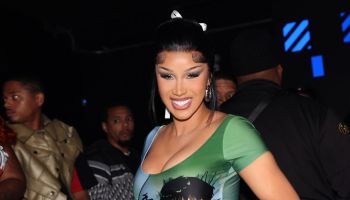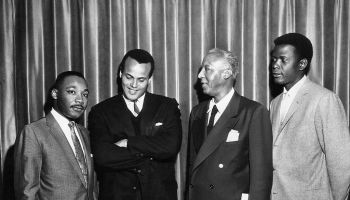If you’re determined to keep your childhood memories intact by thinking only positive thoughts to maintain pleasant nostalgic trips, avert your eyes now.
It’s no secret that early cartoons and even Disney movies featured some of the most racist characters and exaggerated images of black people around, but when we learned that our beloved ice cream had racist roots, we knew the devil had won.
To our surprise, one of the most known tunes in the history of America, often heard blaring from ice cream trucks dotted with pictures of HyperStripes, Fudgesicles, Rocket Pops and Strawberry Shortcakes is associated with a song titled, “Nigger Love A Watermelon Ha! Ha! Ha!”
Like, come on America? Way to confirm our roots are grounded in racism. Luckily, these alternatives exist:
But with our image of the ice cream truck forever tainted, we decided to see what other childhood memories would be destroyed with a history lesson.
Take a trip down memory lane with us to find the racist roots in these other childhood staples, if you dare.
Eenie, Meenie, Miney, Moe:
Sorry kids, this one has nothing to do with catching a tiger by his toe. Because like really…who the hell has ever caught a tiger by the toe? According to the Oxford Dictionary of Nursery Rhymes, the common sing-song melody was used in almost all classrooms and playgrounds in the 1880s by children — except the word tiger was originally “nigger.”
Here, in the chorus of Bert Fitzgibbon’s 1906 song, you can see the use of the racial epithet.
Eeny, Meeny, Miny, Mo
Catch a nigger by his toe,
If he won’t work, let him go
Many versions even had “if he squeals, let him go.” And yes, it’s not really hard to believe that black people, often considered chattel, were being caught by their toes in 17th, 18th, 19th and 20th century America. Sadly.
That Ice Cream Tune:
“Wait. Are you telling me that every time I ran to the ice cream truck I was engaging in some totally racist, stereotypical shit?” Yep. Is anything sacred? Like…at least ice cream.
It’s true. The ice cream tune that conditioned us to beg mom and dad for money has some pretty fucked up roots. Take it from NPR’s Theodore R. Johnson, who dug up its racist roots when he discovered the original tune by Harry C. Browne. The song, “Nigger Love A Watermelon Ha! Ha! Ha!” was released in 1916 on Columbia Records and has the following lyrics:
Browne: “You niggers quit throwin’ them bones and come down and get your ice cream!”
Black men (incredulously): “Ice Cream?!?”
Browne: “Yes, ice cream! Colored man’s ice cream: WATERMELON!!”
Nigger love a watermelon ha ha, ha ha! For here, they’re made with a half a pound of co’l There’s nothing like a watermelon for a hungry coon
In short, 19th century ice cream parlors played popular minstrel songs of the day, and when ice cream trucks became popular, the music boxes installed in them to advertise their presence in a neighborhood would play those same old tunes to draw people in. We just…can’t. But Columbia Records is no stranger to making blackface-era music that used the popular tune. You can read more here. And maybe choose your ice cream trucks a little more carefully now.
Zip-A-Dee-Do-Dah:
We’re sure upon reading the title to the popular Oscar-winning song, the familiar tune got stuck in your head. We apologize in advance.
The lyrics to the award-winning song aren’t necessarily racist, but its origins definitely are. Taken from Zip Coon, a blackface character who parodied a free, bumbling black man failing to conform to white high society, the lyrics to a song of the same name go:
“O zip a duden duden duden zip a duden day.”
Enter that oh-so-familiar tune (which you can watch above). Did we also mention Zip Coon used the same music from “Nigger Love A Watermelon Ha! Ha! Ha!?” Let’s just do away with this tune forever, shall we?
Pick A Bale Of Cotton:
I mean, for obvious reasons.
But surprisingly, a lot of people still fondly remember singing this song as a kid at school. No shade if you were a kid happily singing along when your kindergarten teacher started the tune, but anything with these lyrics — Gonna jump down, spin around, Pick a bale of cotton, Gonna jump down, spin around, Pick a bale a day, Oh lordy, pick a bale of cotton, Pick a bale a day — probably conjures up a pretty painful past and should be avoided like the plague.
Oh! Susanna:
Again. Obvi. Just check out the minstrel-esque lyrics:
I came from Alabama, Wid a banjo on my knee,
I’m gwyne to Louisiana, My true love for to see.
It rain’d all night the day I left, The weather it was dry,
The sun so hot I froze to death; Susanna, don’t you cry.
Chorus:
Oh! Susanna, Oh don’t you cry for me,
cos’ I’ve come from Alabama, Wid my banjo on my knee
I jumped aboard the telegraph, And trabbled down the riber,
De lectric fluid magnified, And killed five hundred nigger.
De bullgine bust, de horse run off, I really thought I’d die;
I shut my eyes to hold my breath, Susanna don’t you cry.
Turns out the song, written by Stephen Foster in 1848, was a staple in minstrel show tradition and like many, featured the same “African-American” dialect blackface characters popularized.
Fuck.
When I See An Elephant Fly:
This is actually just one of many clever ways Disney films sprinkle racism into their story lines by using black animals to represent black people.
Case in point: these crows who…ahem…crow the song “When I See An Elephant Fly” in a stereotypical black vernacular in the childhood film Dumbo.
“I saw a peanut stand, heard a rubber band, I saw a needle winked its eye. I’d be done see’n bout everything. When I see an elephant fly.”
Must we mention that the head crow’s name is Jim. As in Jim…Crow? Sucks when you have to make these connections as an adult, huh?
PHOTO CREDIT: Giphy, Getty | VIDEO SOURCE: YouTube
















